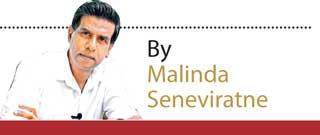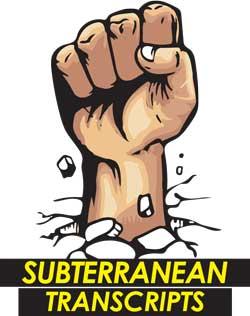01 Apr 2021 - {{hitsCtrl.values.hits}}
 That Meemure of, say, twenty years ago, is no longer the Meemure that you will encounter today. Those who are ignorant of changes that have taken place might argue that the villagers always had a symbiotic relationship with the jungle
That Meemure of, say, twenty years ago, is no longer the Meemure that you will encounter today. Those who are ignorant of changes that have taken place might argue that the villagers always had a symbiotic relationship with the jungle
 Unclear. Untold. Unfair. These are words that one can reasonably expect in any decent conversation or review of the recent UN Human Rights Council resolution on/against Sri Lanka. However, such dismal descriptives are applicable to other matters, institutions and processes as well.
Unclear. Untold. Unfair. These are words that one can reasonably expect in any decent conversation or review of the recent UN Human Rights Council resolution on/against Sri Lanka. However, such dismal descriptives are applicable to other matters, institutions and processes as well.
Just the other day, those words were uttered at the launch of Dr. Prasanna Cooray’s book ‘Politics of a Rainforest: Battles To Save Sinharaja’. L. J. Mendis Wickramasinghe is a Sri Lankan herpetologist, taxonomist, naturalist, wildlife photographer, framed his observations with that telling end-note.
The book contains much information on the subject. Mendis Wickramasinghe’s thoughts as well as those expressed by others offered insights rich in detail and nuance. The picture that emerged was worrisome and not only on account of the horror stories of deforestation doing the rounds, which, by the way, are marked as much by fact as hyperbole.
 What is most worrisome is the dimensions of ignorance demonstrated by commentators, the officials, politicians, self-righteous, the horror-stricken and the loud objectors. There are also the inevitable cash-in attempts motivated by political capital to be secured. Such efforts are not unusual and typically are the bread and butter of people whose interest in ecological matters are subservient to political designs.
What is most worrisome is the dimensions of ignorance demonstrated by commentators, the officials, politicians, self-righteous, the horror-stricken and the loud objectors. There are also the inevitable cash-in attempts motivated by political capital to be secured. Such efforts are not unusual and typically are the bread and butter of people whose interest in ecological matters are subservient to political designs.
Of course the hue and cry even if politically motivated do have a positive impact. They draw attention to things that do warrant investigation, even if one were conservative. There’s a downside to it as well — the ill-willed only need to debunk the rhetoricians in order for the issue to be discredited.
Two things get dismissed; the enormity of the problem and the complexity. The first gets pooh-poohed. The second gets little or no play at all. Both outcomes can have seriously negative impacts.
Complexity. This is a word that all nature-lovers, officials, politicians and even citizens who are less invested in things ecological (compared to other concerns) should take into account. Mendis Wickramasinghe interjected an interesting example. In a word (or name), Meemure.
Meemure. Say it. Close your eyes and say it. It’s like someone humming a melody. Now think ‘Meemure.’ You will remember all you’ve heard of the name and the place. Idyllic. Dreamy. Mysterious. You can pick one of many adjectives. It’s a yanna hithena thanak (a place you want to visit).
Meemure. You might remember the name as one of the weekly ‘stops’ in the President’s Game Samaga Pilisandara (Conversation with the village(rs)) programme. During that visit some villagers had requested the President to permit them to cultivate cardamom. On the face of it, a reasonable request considering that people in the area have harvested cardamom from the surrounding forests for centuries, i.e. until the possible dangers were noted, studied, policy recommendations submitted and laws enacted to stop the practice.
 Today, there’s no juggery that’s not sugar-made. Today, if a villager falls seriously ill (at the ‘wrong’ time of the day), he/she might die on the way to the hospital because of the sheer traffic — it’s now a tourist destination, not an idyllic village
Today, there’s no juggery that’s not sugar-made. Today, if a villager falls seriously ill (at the ‘wrong’ time of the day), he/she might die on the way to the hospital because of the sheer traffic — it’s now a tourist destination, not an idyllic village
The problem is simple. That Meemure of, say, twenty years ago, is no longer the Meemure that you will encounter today. Those who are ignorant of changes that have taken place might argue that the villagers always had a symbiotic relationship with the jungle. They harvested various things but without compromising regenerative capacities, without felling trees, without facilitating any decline in biodiversity and so on. Then. Not any more.
Today, the notion of the innocent villager robbed of a lifestyle where livelihood was made in part by an engagement with the forest is a convenient cover. There’s a difference between someone picking cardamom growing wild to flavour a meal and someone growing cardamom for commercial purposes. The latter type can and do abuse opportunities offered to the former in good faith.
Today, there’s no jaggery that’s not sugar-made. Today, if a villager falls seriously ill (at the ‘wrong’ time of the day), he/she might die on the way to the hospital because of the sheer traffic — it’s now a tourist destination, not an idyllic village. Of course there’s good and bad in these ‘developments.’ Some villagers have and continue to prosper. Some lament. In any event, it’s a different Meemure that’s out there. Well, it is a different country too. The economic system has undergone a lot of transformation. Profit is a powerful driver that can obliterate other factors. The needs-of-the- here-and-now constitutes a powerful objector to sustainable lifestyles and of course all those other things flagged by ecologists, nature-lovers, econazis and of course those who use ‘ecology’ as a convenient armor in petty and narrow political battles.
Meemure, moreover, could be a metaphor for what’s happening in many parts of the country, especially when it comes to sensitive ecologies. Only the scientists truly know what’s what about such things. Indeed, anyone who truly loves nature will take the time to learn the science or seek the views of the scientists. Others are essentially dabblers. Dabblers can harm, knowingly or unknowingly.
As Mendis-Wickramasinghe pointed out, most who go to Sinharaja, for example, might want to see a bear, an elephant or a leopard. No bears, he said. There are some leopards, he said. Maybe elephant-sightings too. For that, he said, you would have to spend a long time there. More importantly, he showed pictures of all kinds of creatures that those who look for ‘the big guys’ would most certainly miss. He spoke of what damage can be caused by ignorance of complex phenomenon and processes, for things are connected in numerous ways. If you don’t see the complexity, your response, even with the best of intentions, could engender monumental disasters.
And here’s something else he said. Mendis-Wickramasinghe offered that we have a very narrow notion of ‘diversity’. We limit it to ethnicity and religion. How about the hundreds of indigenous species of fauna and flora, he posed. How about history? How about effective land-use options? How about impact on climate? How about, yes, the people, in these ‘Meemures’ and elsewhere?
Meemure. Yanna hithena thanak, that it is. Is it an inna hithena thanak (a place you want to remain), though? Think about it.
Things are unclear. Untold. Unfair. Certain things are even untenable. These are words that those who talk of development as being antithetical to the environment and even those who do not cut it that way, rarely appreciate.
[email protected]. www.malindawords.blogspot.com
29 Nov 2024 2 hours ago
29 Nov 2024 3 hours ago
29 Nov 2024 4 hours ago
29 Nov 2024 5 hours ago
29 Nov 2024 5 hours ago